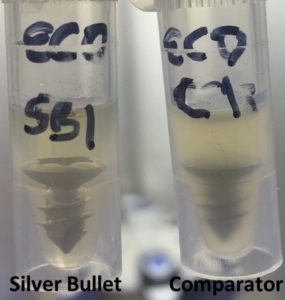This medical device is taking a bullet for you: Emery Pharma tests surgical screw for anti-biofilm activity
*This blog has been written and published with permission from Silver Bullet Therapeutics, Inc. For more details and information, please refer to their press release.
One of the major issues surrounding medical devices in modern-day medicine is their propensity to create an environment that allows bacteria to adhere to their surfaces and form biofilms. Smooth surfaces are less prone to forming biofilms than rough surfaces, typically seen in medical devices. At Emery Pharma, we have the capability to test if a medical device tends to adhere to multi-drug resistant (MDR) bacteria that form biofilms, as well as to test if the medical device possesses antimicrobial activity that inhibits the formation of biofilms by MDR bacteria.
![Medical Device[1] Copy](https://emerypharma.com/wp-content/uploads/2022/09/Medical-Device1-copy-300x150.jpg)
Often, bacteria multiply, secrete, and enclose themselves in a matrix composed of polysaccharides, DNA, and proteins, which results in restricted penetration of antibacterial agents into the biofilm interior, leading to the development of drug resistance [1]. Unfortunately, biofilm-forming bacteria can infect surgical implants and can even result in fatality. An example of surgical implants (Posterior Lip Augmentation Device, PLAD, Depuy, UK) is shown on the right [2]. Biofilm is a serious threat and challenge in modern-day medicine, and novel surgical devices with effective antimicrobial properties are essential to address this unmet medical need.
Recently, we were approached by Silver Bullet Therapeutics, Inc., a Bay Area company that has developed a novel medical device with unique and effective antimicrobial properties. We at Emery Pharma are pleased to have completed a collaboration with Silver Bullet Therapeutics, Inc., where we quantitatively showed the effectiveness of their new OrthoFuzIon®-Galvanis screws (Antimicrobial Bone Screws) against the multi-drug resistant strains of ESKAPE pathogens.
Here at Emery Pharma, we tested the antimicrobial activity of their screw against the ESKAPE pathogens: Enterococcus faecium, Staphylococcus aureus, Klebsiella pneumoniae, Acinetobacter baumannii, Pseudomonas aeruginosa, and Enterobacter species. These pathogens are responsible for a majority of hospital-acquired infections (HAIs) and surgical site infections and are known to be some of the toughest bacteria to kill [3]. The panel we used in the study included Vancomycin-resistant Enterococcus faecium, Multidrug-resistant Acinetobacter baumannii, Carbapenem-resistant Klebsiella pneumoniae, Multidrug-resistant Pseudomonas aeruginosa, and Methicillin-resistant Staphylococcus aureus (MRSA) along with an extended-spectrum β-lactamase-producing Escherichia coli. The ability of OrthoFuzIon®-Galvanis screws to kill ESKAPE pathogens indicated highly effective antimicrobial activity against the majority of bacteria associated with hospital-acquired infections, and our findings demonstrated a major breakthrough in their technology to treat HAIs and biofilm-forming MDR bacteria.
One microbiological technique Emery Pharma used to show the antimicrobial activity of the OrthoFuzIon® Antimicrobial Bone Screws was a 24-hour Time-Kill analysis. During a Time-Kill analysis, the test articles, in this case, the OrthoFuzIon® Screws, are inoculated with each of the selected ESKAPE pathogen strains individually. The screws were incubated in this inoculum for 24 hours. CFU/mL post-treatment can be compared with the initial CFU/mL to determine the antimicrobial activity of the test articles against each species of bacteria. We compared and evaluated the antimicrobial activity of Silver Bullet Therapeutics’s OrthoFuzIon®-Galvanis screws with a comparator titanium bone screw that is currently available.
In comparison with the comparator titanium bone screw, Silver Bullet Therapeutics's OrthoFuzIon® Screws demonstrated excellent antimicrobial activity with the killing of over 99.9% of bacteria against all of the above test pathogens.
These findings clearly demonstrate the potential of OrthoFuzIon® Screws in killing bacteria in the bone screws that are exposed during surgery and during the time spent in the hospital in general, and thus have lifesaving potential. The figure below shows the killing of multidrug-resistant E. coli by Silver Bullet Therapeutics’s OrthoFuzIon® Screw.

Another microbiological testing service Emery Pharma performed on the OrthoFuzIon® Screws was a Bacterial Adherence Assay. Here, we were able to test the CFU/mL of bacteria present on the screw following a 24-hour exposure of the screws to the test bacteria. By comparing this CFU/mL to the initial CFU/mL, we were able to show no bacterial adherence or biofilm formation on the OrthoFuzIon® Screws.
Through both 24-hour Time-Kill analysis and a bacterial adherence assay, Emery Pharma showed that Silver Bullet Therapeutics’s OrthoFuzIon® Screws outperformed comparator titanium screws and have the potential to be a lifesaving new tool in surgery to prevent infections by ESKAPE pathogens. This is just one example of how Emery Pharma can work with clients as an extension of their R&D department to fulfill the biological testing services based on a company’s needs. Some of the tests we regularly perform include minimum inhibitory/bactericidal concentration (MIC/MBC), biofilm testing, antibiotic resistance testing, cytotoxicity testing, antimicrobial synergy assays, sterility testing, endotoxin testing, and other important USP standards testing.
Emery Pharma also provides expert medicinal, analytical, and bioanalytical chemistry testing such as NMR and LC-MS services, biologics analysis , HPLC method development, and medicinal chemistry support. Emery Pharma uses the expertise of our Ph.D. and M.Sc. scientists not only in performing tests for clients but utilizing their knowledge to help figure out the best mode of action to obtain the results needed, help answer any questions along the way, and provide expert analysis. Contact us today through our website or call us at +1 (510) 899-8814!
About the Author
Originally authored by Dr. Ana Najafi and Dr. Sri Arumugam. This article was reviewed and updated on June 6, 2025 by Dr. Janet Liu, current Director of Biology.
References
- Lewis, K. (2001). Riddle of biofilm resistance. Antimicrobial agents and chemotherapy, 45(4), 999-1007.
- Rajpura, A. and Board, T., 2013. Complications following total hip arthroplasty. Infection, 1, p.9.
- Boucher, H.W., Talbot, G.H., Bradley, J.S., Edwards, J.E., Gilbert, D., Rice, L.B., Scheld, M., Spellberg, B. and Bartlett, J., 2009. Bad bugs, no drugs: no ESKAPE! An update from the Infectious Diseases Society of America. Clinical Infectious Diseases, 48(1): 1-12.
